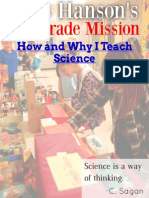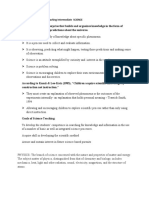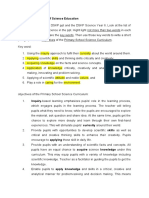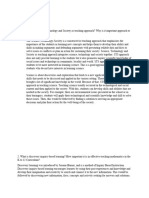Magic School Bus
Magic School Bus
Uploaded by
api-231750421Copyright:
Available Formats
Magic School Bus
Magic School Bus
Uploaded by
api-231750421Original Title
Copyright
Available Formats
Share this document
Did you find this document useful?
Is this content inappropriate?
Copyright:
Available Formats
Magic School Bus
Magic School Bus
Uploaded by
api-231750421Copyright:
Available Formats
Teachers can integrate science with other subjects How do students learn science best?
Wh
Why learn science?
Instructional strategies What are 21st Century Skills: Employability Skills? What are 21st Century Skills: Technology Skills? Classroom examples
Instructional Manual
To start to the magic school bus you must make sure you have checked that all the necessary parts are working properly. Each part contributes to the success of a smooth ride on the magic school bus, just like in the science classroom. Wheel 1- What are 21st Century Employability Skills? Employability skills are centered on the idea that students should become caring and productive citizens in the society they live in. Examples of employability skills include: setting goals, working appropriately and productively with others, adapting to different roles, listening to others ideas with an open mind, taking responsibility for ones own actions, engaging in effective problem solving, and understanding the importance of self- confidence. Wheel 2- What are 21st Century Technology Skills? Technology skills are centered on the idea that students will be empowered with knowledge about technology to live productively and effectively in the society they live in. Examples of technology skills include: using technology to present new ideas, using a variety of technology tools to help student work collaboratively with students inside and
outside the classroom, solving problems using technology, using technology to research real world issues and to answer questions.
Engine-How do you learn science best? Science is learned best when students can use inquiry -based learning. Inquirybased learning involves students seeing themselves as active participants during the learning process, students exploring and developing a natural curiosity about science, and students developing and carrying out different experiments. In addition, during inquiry -based learning students communicate using a variety of methods such as: journaling, charting, graphing and drawing. Furthermore, inquiry based learning involves students coming up with their own explanations and solutions. During inquiry- based learning students should be asking questions and observing objects by noticing patterns, changes, similarities, differences and making connections with what they previously thought was true. The teacher has a very different role in inquiry- based learning, thus she is not the soul provider of knowledge. On the contrary, he or she is there to ask open -ended questions and encourage students to think critically. In addition, the teacher should be gathering data about the students by walking around and observing their understanding of the topic.
Headlight - What instructional strategies are most effective? Student- centered learning has proven to be effective in the science classroom because it increases students motivation to learn, gives students a deeper understanding of science, students are able to remember the most important concepts when they are out of elementary school and students have a more positive attitude toward the subject of science. A student- centered classroom consisted of students creating their own knowledge based on their own experiences. In addition, teachers encourage students to reflect on their thinking and understanding. Furthermore, students engage in meaningful real world experiences related to science. Lastly, students work together with their peers to complete experiments and science related activities. Backlight-What parents will see in my science classroom? While looking inside my classroom, you will see student learning about all the areas of science: physical science, earth science, chemistry and life science. For example, in physical science students will learn about sound, light, roller coasters, and magnetism. Furthermore, students will build their own roller coaster out of pvc pipe and masking tape.
In earth science, students will learn about rocks and minerals, space, volcanoes, earthquakes, hurricanes, and tornadoes. Students will have the opportunity to design their own model volcano and use science kits to discover different types of rocks. In chemistry, students will learn the difference between acids and bases by experimenting with household chemicals. In addition, they will experiment with gel spheres by mixing them with different chemicals. In life science, students will learn about different animals, cell structure, and the human body. Lastly, in my classroom you will see a strong relationship between parents and teachers when I ask them about their childs interests and methods that they suggest for success. After all, parents know their children the best. Students will also be given the opportunity to explore materials with all five of their senses; hearing, smelling, touch, tasting and seeing.
Gas Tank- Why do students need to learn science? Students should be provided with opportunities to develop understanding and skills necessary to be productive individuals who are equipped to succeed in todays technology- rich global economy. When students are actively involved in learning science, they better understand science concepts and important life skills. Furthermore, science can be integrated into many different topics. Moreover, learning about science is a great way to spark the natural curiosity students have about the world around them. Many times, students come to find that they were always meant to be a scientist. Lastly, science offers a great set of resources for students to learn about new and interesting vocabulary that they have never seen before.
You might also like
- Methods of Teaching ChemistryDocument342 pagesMethods of Teaching ChemistryFabricio Carvalho75% (4)
- 50 Innovative Teaching Methods in Teaching ScienceDocument52 pages50 Innovative Teaching Methods in Teaching Sciencecirilo cuanan100% (2)
- Matters: CienceDocument2 pagesMatters: Cienceapi-300868069No ratings yet
- Assignment 4Document3 pagesAssignment 4api-313281357No ratings yet
- Parent News Letter ScienceDocument4 pagesParent News Letter Scienceapi-606355723No ratings yet
- Sci-201-Teaching Science in Elementary GradesDocument28 pagesSci-201-Teaching Science in Elementary GradesbarredajohnpatrickNo ratings yet
- Best Practice in Elementary ScienceDocument5 pagesBest Practice in Elementary ScienceJhelai OconNo ratings yet
- Research ProposalDocument6 pagesResearch ProposalMian SahibNo ratings yet
- Strategies in Teaching Science in Elementary Grades: Utilize Developing Math Skills and Problem-SolvingDocument11 pagesStrategies in Teaching Science in Elementary Grades: Utilize Developing Math Skills and Problem-SolvingFerdinand ReymundoNo ratings yet
- Lozada Assignment - Science Is impo-WPS OfficeDocument4 pagesLozada Assignment - Science Is impo-WPS OfficeRosemarie banogNo ratings yet
- Science PamphletDocument5 pagesScience Pamphletapi-270741994No ratings yet
- 50 Ways Effective Science TeachingDocument8 pages50 Ways Effective Science TeachingArnel InoyNo ratings yet
- 50 Methods in ScienceDocument26 pages50 Methods in ScienceGJ Acas PacquingNo ratings yet
- Science Innovation TechniquesDocument16 pagesScience Innovation TechniquesPrecila N. GarciaNo ratings yet
- Normal 61b07efc02bf1Document15 pagesNormal 61b07efc02bf1diala aliNo ratings yet
- Science EducationDocument7 pagesScience EducationRyan Ceazar AguilaNo ratings yet
- Teaching Science in Elementary GradesDocument21 pagesTeaching Science in Elementary GradesMa Paula Jean BrezuelaNo ratings yet
- VisionforscienceeducationDocument3 pagesVisionforscienceeducationapi-280103347No ratings yet
- Report Advance Science TeachingDocument25 pagesReport Advance Science TeachingMhimi ViduyaNo ratings yet
- ScienceDocument38 pagesScienceapi-272545554No ratings yet
- Lesson # 1 Introduction To SCIENCEDocument5 pagesLesson # 1 Introduction To SCIENCEZhayna CaleonNo ratings yet
- Chapter 1-5 (Mercy)Document69 pagesChapter 1-5 (Mercy)Aneke victorNo ratings yet
- 6436 FinalDocument23 pages6436 FinalSadia RiazNo ratings yet
- AssignmentDocument9 pagesAssignmentsharveyishwarNo ratings yet
- ECED 12 - Submit A Portfolio OnDocument6 pagesECED 12 - Submit A Portfolio Onkasandraarianne1003No ratings yet
- Activity 1 Objectives of Science EducationDocument2 pagesActivity 1 Objectives of Science EducationYu ErinNo ratings yet
- Pedagogia ActualDocument18 pagesPedagogia ActualRamiro GuzmanNo ratings yet
- METHODOLOGYOFTEACHINGSCIENCEDocument30 pagesMETHODOLOGYOFTEACHINGSCIENCEteclar44nyakotyoNo ratings yet
- ArtifactDocument6 pagesArtifactapi-516988940No ratings yet
- What Is ScienceDocument5 pagesWhat Is Scienceliezelconsigna03No ratings yet
- 11 Innovative Strategies in Teaching ScienceDocument15 pages11 Innovative Strategies in Teaching ScienceJunar CanoNo ratings yet
- Science Reporting - G-7Document19 pagesScience Reporting - G-7KENN JOSHUA AQUINONo ratings yet
- 8609 - 8614 Assignment AiouDocument7 pages8609 - 8614 Assignment AiouSami Uddin ShinwariNo ratings yet
- 50 Innovative Teaching Methods in ScienceDocument18 pages50 Innovative Teaching Methods in ScienceAilljim Remolleno ComilleNo ratings yet
- Science Pedagogical InterventionsDocument55 pagesScience Pedagogical InterventionsAngeline Libunao NecorNo ratings yet
- Innovations in Science TeachingDocument20 pagesInnovations in Science TeachingRichard Balicat Jr.No ratings yet
- SOME OF (Your) ANSWERS On The Value of iSTEM ActivitiesDocument4 pagesSOME OF (Your) ANSWERS On The Value of iSTEM ActivitiesDorina BucuriNo ratings yet
- Learning Package 2-Innovative Teaching Methods in ScienceDocument6 pagesLearning Package 2-Innovative Teaching Methods in ScienceDivine Joy GaraNo ratings yet
- 50 Innovative Teaching Methods in Science - EdsysDocument15 pages50 Innovative Teaching Methods in Science - EdsysRuslan RamazonovNo ratings yet
- M Phil T SkillDocument26 pagesM Phil T Skillsubroto36No ratings yet
- STEAM in Education NotesDocument2 pagesSTEAM in Education NotesRachael FiergeNo ratings yet
- Science and TechnologyDocument9 pagesScience and TechnologyanjumNo ratings yet
- Innovative Teaching Methods in ScienceDocument9 pagesInnovative Teaching Methods in ScienceXia JimNo ratings yet
- Week 7 Group 8 Section 4Document3 pagesWeek 7 Group 8 Section 4Chareynel Ayuban RadañaNo ratings yet
- Chapter 7 Techniques On How To Teach Science in Elementary LevelsDocument13 pagesChapter 7 Techniques On How To Teach Science in Elementary Levelsscarletash169No ratings yet
- Science Education in The PhilippinesDocument13 pagesScience Education in The PhilippinesAndrea L.100% (1)
- Assignment M.ed FourDocument3 pagesAssignment M.ed FourMuhammad AsifNo ratings yet
- Chapter 5 Science LiteracyDocument11 pagesChapter 5 Science LiteracyJulius MacaballugNo ratings yet
- Biology Teaching Styles.Document3 pagesBiology Teaching Styles.ankamahinstagramNo ratings yet
- Science 2 Secondary PhysicsDocument19 pagesScience 2 Secondary PhysicsScribdTranslationsNo ratings yet
- DocumentDocument12 pagesDocumentLaarnie Blessful SucalNo ratings yet
- Simple Green Ink Stationery-WPS OfficeDocument1 pageSimple Green Ink Stationery-WPS OfficeFake DraculaNo ratings yet
- Differentiate Instructions Important and Make Possible To Maximize Learning For AllDocument1 pageDifferentiate Instructions Important and Make Possible To Maximize Learning For AllCrislieNo ratings yet
- ConstructivismDocument17 pagesConstructivismJennifer DizonNo ratings yet
- As Early Childhood EducatorsDocument5 pagesAs Early Childhood Educatorsadeel sarwarNo ratings yet
- Provoking Curiosity: Student-Led STEAM Learning for Pre-K to Third GradeFrom EverandProvoking Curiosity: Student-Led STEAM Learning for Pre-K to Third GradeNo ratings yet
- Making Every Science Lesson Count: Six principles to support great teaching and learning (Making Every Lesson Count series)From EverandMaking Every Science Lesson Count: Six principles to support great teaching and learning (Making Every Lesson Count series)No ratings yet
- Regional Planning Full Document SRDocument147 pagesRegional Planning Full Document SRSrinivasan Rengasamy93% (76)
- Research Paper - Definition, Structure, Characteristics, and Types - Wr1terDocument15 pagesResearch Paper - Definition, Structure, Characteristics, and Types - Wr1teraso4227No ratings yet
- University of Caloocan City: Senior High SchoolDocument12 pagesUniversity of Caloocan City: Senior High SchoolMike AntolinoNo ratings yet
- Model Research ReportDocument35 pagesModel Research ReportLeinel Macutay MalazzabNo ratings yet
- IIT PalakkadDocument6 pagesIIT Palakkadswadhish venugopalNo ratings yet
- 214 - Module4 - PhilosophicalDocument19 pages214 - Module4 - PhilosophicalJD VergaraNo ratings yet
- Prelim Exam-Bus Rsh..Document6 pagesPrelim Exam-Bus Rsh..JhenDzenNo ratings yet
- Public Ad (Lecture 18) Major Schools of Thought in AdministrationDocument23 pagesPublic Ad (Lecture 18) Major Schools of Thought in AdministrationHafiz Farrukh Ishaq IshaqNo ratings yet
- Anino, Bonono, Yunzal Math100 Prelim M1 L1 For UploadingDocument13 pagesAnino, Bonono, Yunzal Math100 Prelim M1 L1 For UploadingPhilip CabaribanNo ratings yet
- Outcome-Based Professional Assessment Examination: Dato' Prof. Ir. Dr. Hassan Basri Prof. Ir. Dr. K. S. KannanDocument70 pagesOutcome-Based Professional Assessment Examination: Dato' Prof. Ir. Dr. Hassan Basri Prof. Ir. Dr. K. S. KannanguypenghuniNo ratings yet
- In Tell: TodayDocument1 pageIn Tell: Todaysoutherland joanneNo ratings yet
- Physical Science (Q4W2)Document6 pagesPhysical Science (Q4W2)SHEEN ALUBANo ratings yet
- SummaryDocument2 pagesSummaryscribdRNo ratings yet
- Evidence Based Science Communication AnDocument17 pagesEvidence Based Science Communication AnJennifer De CastroNo ratings yet
- Calibration of The Test of Relational Reasoning: Psychological Assessment November 2015Document18 pagesCalibration of The Test of Relational Reasoning: Psychological Assessment November 2015vedran1980No ratings yet
- The Influence of Problem Based Learning PBL On Mathematics Learning Systematic Literature ReviewDocument19 pagesThe Influence of Problem Based Learning PBL On Mathematics Learning Systematic Literature ReviewMohd Shah FarhanNo ratings yet
- Goffman The Invisible Technologies of Goffmans Sociology From TheDocument17 pagesGoffman The Invisible Technologies of Goffmans Sociology From TheGus MarNo ratings yet
- An Anthology of Theories and Models of DesignDocument454 pagesAn Anthology of Theories and Models of Designcaserisimo hechoconamorNo ratings yet
- Contribution of Social ScientistsDocument13 pagesContribution of Social ScientistsAparna K.RNo ratings yet
- Science 8 Quiz 2Document2 pagesScience 8 Quiz 2diane kris del socorroNo ratings yet
- Right 1st TimeDocument15 pagesRight 1st TimeBui Le Thuy Trang (FE FIC HN)No ratings yet
- Theses GuideDocument73 pagesTheses GuidehasiemathicNo ratings yet
- MA Overcoming PitfallsDocument7 pagesMA Overcoming PitfallsmumbiNo ratings yet
- SOPDocument2 pagesSOPPranav SinghNo ratings yet
- Sar Au 24 03 2018 1Document366 pagesSar Au 24 03 2018 1Cody LeeNo ratings yet
- CHAPTER III: Methodology: DesignDocument11 pagesCHAPTER III: Methodology: DesignJeremiah Noromor RonquilloNo ratings yet
- Branches of AnthropologyDocument26 pagesBranches of AnthropologyRica RegisNo ratings yet
- Allama Iqbal Open University, Islamabad Course: Foundations of Science Education (8627)Document5 pagesAllama Iqbal Open University, Islamabad Course: Foundations of Science Education (8627)sadia mushtaqNo ratings yet
- Philosophy: We Believes ThatDocument2 pagesPhilosophy: We Believes ThatKinjal VasavaNo ratings yet
- Assessing The Quality of Science Journalism in The Philippines: Infotainment Vs Critical ScienceDocument15 pagesAssessing The Quality of Science Journalism in The Philippines: Infotainment Vs Critical ScienceAnna GirlNo ratings yet

























































































